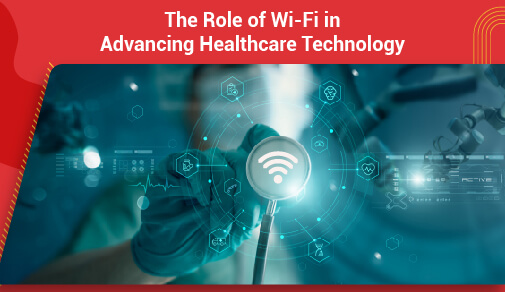The Role of WiFi in Advancing Healthcare Technology
- 329
- |
- 08 August 2024
- |
- 5 minutes

In today's fast-paced world, technology plays a crucial role in advancing various industries, and healthcare is no exception. One of the key technologies that have revolutionised the healthcare sector is WiFi. In this article, we will explore the importance of WiFi in modern healthcare, impact of wifi on health, the benefits of WiFi in healthcare facilities, WiFi enabled devices in healthcare, and the future of WiFi in the healthcare industry.
The Importance of WiFi in Modern Healthcare
WiFi and health have become an integral part of modern healthcare facilities, providing seamless connectivity and instant access to data. Healthcare professionals rely on WiFi and health related technology to access electronic health records, medical imaging, and other crucial information that helps them make informed decisions about patient care. WiFi enables real-time communication between healthcare providers, allowing for quick consultations and collaboration on complex cases.
In addition to improving communication and access to information, WiFi has also facilitated the use of advanced medical devices and technologies. For example, wearable devices that monitor patients' vital signs can transmit data through WiFi to healthcare providers in real time, allowing for continuous monitoring and prompt intervention when needed. Remote patient monitoring and telemedicine services have also been made possible thanks to WiFi connectivity, enabling patients to receive care from the comfort of their homes.?
Enhancing Patient Care with WiFi
The impact of wifi on health facilities has transformed the way healthcare is delivered, enhancing the quality of patient care and improving outcomes. With WiFi enabled devices and systems, healthcare professionals can streamline workflows, reduce errors, and improve efficiency. For example, electronic prescribing systems can automatically alert physicians to potential drug interactions, reducing the risk of medication errors.
Moreover, WiFi connectivity allows for the seamless integration of medical devices and systems, creating a connected healthcare ecosystem that enables data sharing and interoperability. This interconnected network of devices, often referred to as the Internet of Medical Things (IoMT), enables healthcare providers to gather valuable insights, track trends, and personalise treatment plans for patients.?
The Future of Healthcare Technology
As technology continues to advance at a rapid pace, the role of WiFi in healthcare will only become more significant. With the rise of artificial intelligence, machine learning, and big data analytics, healthcare providers will rely on WiFi connectivity to access and analyse vast amounts of information to make data-driven decisions. Wearable devices, remote monitoring systems, and telehealth services will continue to rely on WiFi to deliver care to patients wherever they are.
WiFi-Enabled Devices in Healthcare
WiFi enabled devices have revolutionised the way healthcare is delivered. From electronic health records (EHR) systems to remote monitoring devices, WiFi connectivity has made it easier for healthcare professionals to access patient information and collaborate with colleagues virtually. Additionally, patients can now benefit from telemedicine services, allowing them to receive medical care from the comfort of their homes.
Improved Connectivity and Communication
One of the key benefits of WiFi in healthcare technology is improved connectivity and communication. Healthcare providers can now communicate instantly with each other, share vital information, and collaborate on treatment plans in real-time. This seamless exchange of information leads to better coordination of care and ultimately improves patient outcomes.
Enhanced Patient Care
With WiFi-enabled devices, healthcare professionals can provide more personalised and efficient care to their patients. For example, wearable devices that are connected to WiFi can monitor patients' vital signs and send real-time data to healthcare providers. This allows for early detection of potential health issues and timely intervention. Additionally, telemedicine services powered by WiFi enable patients to consult with their doctors remotely, reducing the need for in-person visits and improving access to care.
Data Security and Privacy
While WiFi technology offers numerous benefits in healthcare, it also raises concerns about data security and privacy. Healthcare organisations must implement robust cybersecurity measures to protect sensitive patient information transmitted over WiFi networks. Encryption, multi-factor authentication, and regular security audits are essential to safeguarding patient data and maintaining privacy standards.
Benefits of WiFi in Healthcare Facilities
The use of ACT internet connection in healthcare facilities offers a wide range of benefits for both patients and healthcare providers. Some of the key benefits include:
Improved Efficiency: WiFi enabled devices enable healthcare professionals to access information quickly, collaborate with colleagues, and make informed decisions in real-time.
Enhanced Patient Care: With WiFi enabled devices, healthcare providers can deliver personalised care, track patient progress, and monitor chronic conditions more effectively.
Cost Savings: By streamlining communication and reducing paperwork, WiFi can help healthcare facilities save time and resources.
Patient Engagement: WiFi allows patients to access educational materials, communicate with their healthcare providers, and manage their health proactively.
Future of WiFi in Healthcare
As technology continues to evolve, the future of WiFi in healthcare looks promising. With the advent of 5G networks, the Internet of Things (IoT) and IOT wearables healthcare advancements, healthcare facilities will have access to even faster and more reliable WiFi connections. This will enable the widespread adoption of telemedicine, remote patient monitoring, and even artificial intelligence in IOT wearables healthcare adoption, leading to more efficient and personalised care for patients.
In conclusion, having internet from the best WiFi provider like the ACT internet connection plays a crucial role in advancing healthcare technology by enabling seamless communication, access to information, and improved patient care. As technology continues to evolve, the future of WiFi in healthcare holds great promise for transforming the way healthcare is delivered and managed making it important for us to choose the best WiFi providers. With its many benefits and potential applications, WiFi will continue to be a cornerstone of modern healthcare delivery.



